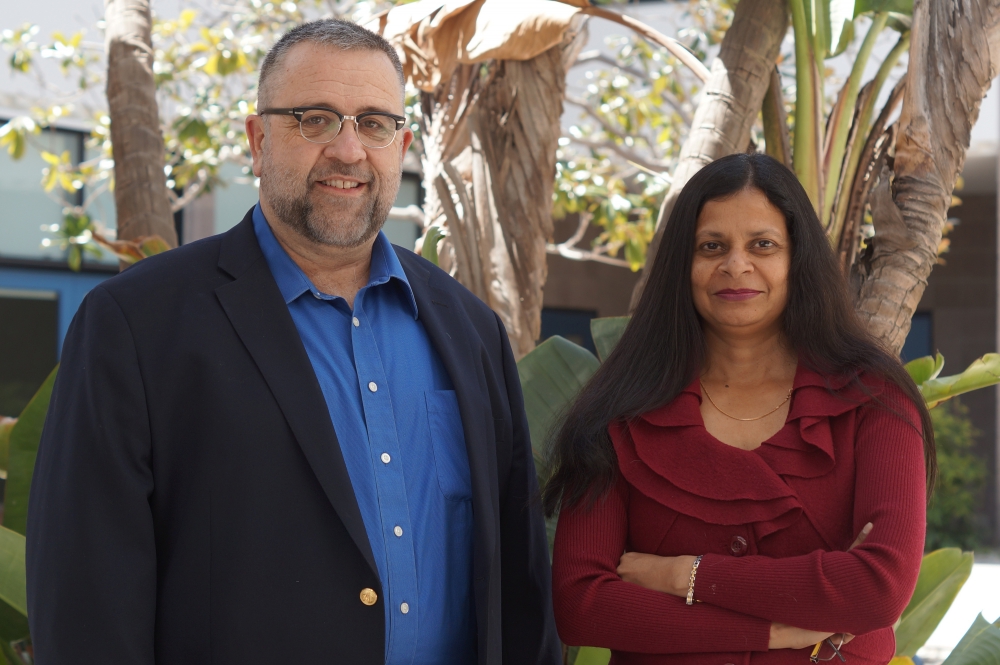
Two Professors Receive Guggenheim Fellowships
Two UC Santa Barbara professors — José Cabezón and Swati Chattopadhyay are among the 173 recipients of 2015 fellowships awarded by the John Simon Guggenheim Memorial Foundation. Appointed on the basis of prior achievement and exceptional promise, the successful candidates were chosen from a group of more than 3,100 applicants.
Guggenheim Fellowships are intended for those who have already demonstrated exceptional capacity for productive scholarship or exceptional creative ability in the arts. The fellowships are awarded across a range of disciplines, including the natural sciences, cinema, musical composition, education, mathematics and the visual arts.
“Winning such a fellowship is a great individual accomplishment for José and Swati and a source of great pride for humanities and fine arts here at UCSB,” said John Majewski, jtters and Science.
Cabezón, the Dalai Lama Endowed Chair in the Department of Religious Studies, is the author of 16 books and more than 100 scholarly articles on various aspects of Buddhist and comparative religion. His most recent book, “Sexuality in Buddhist South Asia” (in press), is a mammoth work that charts classical Buddhist views of sexuality through 1,000 years of South Asian history.
“I am honored and humbled to have been awarded the Guggenheim Fellowship,” said Cabezón. “The award will allow me to spend time working intensively on a project that has been long in the making: a study of Sera, one the largest and most influential monasteries in Tibetan history. I myself studied at the diaspora Sera in Karnataka, India, as a graduate student in the early 1980s. I hope to complete this history of the monastery in time to celebrate Sera’s 600th anniversary in 2019.”
In addition to the Guggenheim Fellowship, Cabezón was also awarded an ACLS/Robert H. N. Ho Family Foundation Collaborative Research Fellowship to work on the Sera project. His collaborator on the ACLS (American Council of Learned Societies) grant is Dr. Penpa Dorjee, head of the Research Department at the Central University of Tibetan Studies in Sarnath, India.
Cabezón received his doctorate in Buddhist studies from the University of Wisconsin, Madison in 1987. The recipient of fellowships from the Fulbright Foundation and the American Institute of Indian Studies, he has been a visiting research scholar at the Sampurnananda Sanskrit University in Varanasi, India, a Rockefeller Fellow at Rice University and an Alexander von Humboldt Research Fellow at the University of Hamburg. Cabezón taught at several universities before becoming a faculty member in 2001.
Swati Chattopadhyay, professor and chair of the Department of History of Art and Architecture, is an architect and architectural historian specializing in modern architecture and urbanism as well as the history of the British Empire. She is the author of “Representing Calcutta: Modernity, Nationalism, and the Colonial Uncanny” (Routledge, 2005), “Unlearning the City: Infrastructure in a New Optical Field” (University of Minnesota Press, 2012) and co-editor (with Jeremy White) of “City Halls and Civic Materialism: Towards a Global History of Urban Public Space” (Routledge, 2014). Her current work includes an epic-scale book project, “Nature’s Infrastructure,” which deals with the infrastructural transformation of the Indo-Gangetic Plain between the 17th and 19th centuries.
“I was delighted to receive the Guggenheim Fellowship, which will allow me take a year off and conduct sustained research and focus solely on the book,” said Chattopadhyay. “This massive project not only combines environmental history, historical geography and urban history but also examines the many effects of human interventions on the Ganges River landscape over a period of centuries.”
Chattopadhyay earned bachelor’s of architecture from Jadavpur University in Kolkata, India; a master’s of architecture from the University of Arizona; and her doctorate from UC Berkeley. Her awards include a National Science Foundation grant; two grants from the American Institute of Indian Studies; a J. Paul Getty Fellowship; a fellowship from the Swedish Collegium for Advanced Study; a Distinguished Visiting Fellowship from Queen Mary, University of London; and the Society of Architectural Historians’ Founders’ Award.
Since its establishment in 1925, the John Simon Guggenheim Memorial Foundation has granted more than $325 million in fellowships to almost 18,000 individuals, including scores of Nobel laureates and poets laureate, as well as winners of the Pulitzer Prize, Fields Medal and other important, internationally recognized honors. The late U.S. Senator Simon Guggenheim and his wife established the fellowships as a memorial to a son who died in 1922.
“The Guggenheim Foundation has always bet everything on the individual, and we’re thrilled to continue the tradition with this wonderfully talented and diverse group,” said Edward Hirsch, the foundation’s president. “It’s an honor to be able to support these individuals to do the work they were meant to do.”



